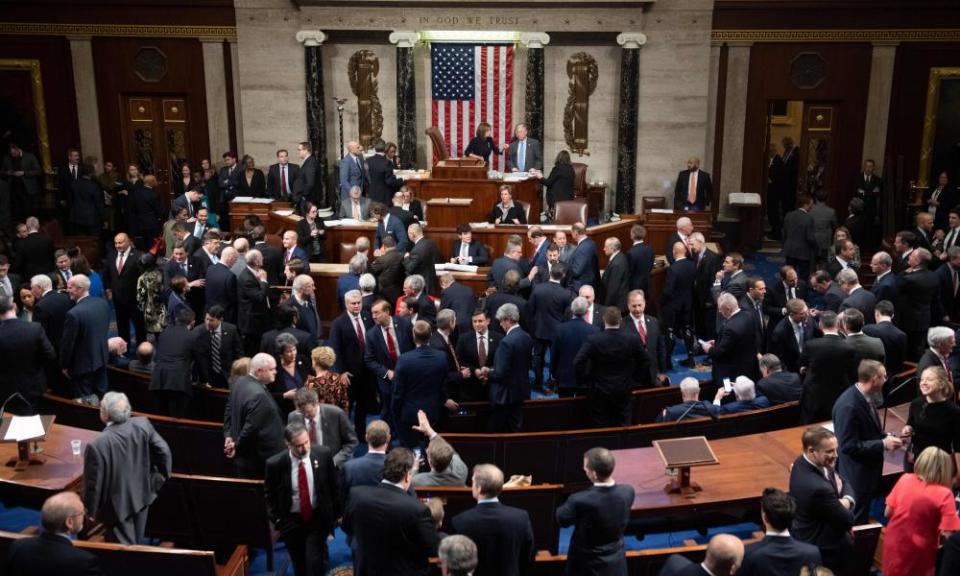Trump was impeached. So why does this feel like an anti-climax?

There is something unsatisfying about the impeachment of Donald Trump. Many of us who loathe him would like nothing more than to see him removed from office. Yet as the Democrats move forward on charges of obstruction and abuse of power, it does not feel like the triumph of righteousness that it should.
Perhaps this is in part because Trump is not being charged for his most serious actual crimes. Like Al Capone being brought down by tax evasion charges, Trump is facing impeachment for one of the least consequential bad acts of his career. The string of alleged sexual assaults? Deporting desperate migrants to their deaths? Destroying the possibility of preventing catastrophic climate change? Causing thousands of deaths by rescinding environmental rules and then covering up the human toll? Escalating drone strikes and then hiding the civilian deaths? These crimes will go uncharged and unpunished. Instead, Congress’s focus is entirely on the question of whether Trump unethically pressured the Ukrainian government to investigate Joe Biden and his ne’er-do-well son. It’s an issue. But given the number of terrible things Trump has done, does it deserve this level of disproportionate focus?
Related: Impeachment won't force Trump out of office. But it matters for our republic | Andrew Gawthorpe
The Democrats’ outrage over the Ukraine scandal feels a little contrived. Would they have been calling so vehemently for impeachment if Barack Obama had pressured another country’s government to investigate one of Trump’s sons’ shady dealings? Republicans are correct when they say that the impeachment is “politically” motivated and is about trying to remove a president from office who they never liked in the first place. It is, and it should be. Some “political” acts are beyond the pale, and every procedural weapon should be utilized in trying to remove a president from office if they are using that office to despoil the earth and terrorize civilians at home and abroad.
A satisfying set of impeachment articles, then, would list the various ways in which Trump has put the future of humanity at risk, and the urgent need to remove him in order to secure peace and a stable planet. But Democrats are not willing to be that confrontational and political (and of course, if they start calling drone strikes and deportation crimes, it will be easy to point out that they did it first). So Ukraine it is.

One also senses that this impeachment carnival may be exactly the sort of thing Trump wants. He knows that he’s not actually going to be removed from office, thanks to the protection of Republicans in the Senate. Now he has the opportunity to portray himself as a persecuted victim, and to accuse the Democrats of being “sore losers” who refuse to accept his legitimacy and are using underhanded means to try to remove him. He will use this impeachment to rally his supporters, telling them that Democrats do not respect the will of the people and want to undo it. (This is precisely what Boris Johnson told British voters about attempts to undo the Brexit referendum, and it proved very successful for him.)
On the one hand, impeaching Donald Trump seems like a no-brainer: the man almost defines “unfit for office” and the list of possible “high crimes and misdemeanors” is endless. On the other hand, impeaching Trump creates a spectacle that voters might not care too much about. The underlying issues do not affect the material wellbeing of working-class Americans in any noticeable way, and not many people are emotionally invested in protecting the reputations of Joe and Hunter Biden. Every moment spent discussing impeachment is a moment not spent discussing healthcare, educational inequity, the black-white wealth gap, the sprawling prison system, the surveillance state, the opioid epidemic, the hollowing out of industrial towns, and the country’s appalling treatment of immigrants. The easy reply is that it’s possible to “do both”, but time and energy are zero-sum: you have to pick and choose what you focus on. Trump would probably love a 2020 election cycle dominated by the impeachment issue, because it relieves him from having to defend his appalling record.
One can see impeachment as a symptom of the continuing failure of the Democratic party to articulate a substantive agenda
One can even see impeachment as a symptom of the continuing failure of the Democratic party to articulate a substantive agenda. Democrats in 2016 focused excessively on Trump’s personal attributes rather than giving disaffected voters a real reason to go to the polls. Now, they’re doing it again: instead of telling people what the Democratic party stands for and why it would be good for the country, they are obsessed with the figure of Donald Trump, and define themselves in opposition to him. Joe Biden’s entire campaign is centered around a promise to restore honor to the White House and purge it of the “malarkey”. But when Trump dominates every discussion, we lose sight of the actual human stakes of politics.
In Jacobin, Doug Henwood asks an important question: what is impeachment for? It’s not going to remove Trump from office, and therefore risks undermining and distracting from the efforts to mount a successful electoral campaign against Trump. Henwood points out that the impeachment drama is simultaneously dull and distracting, and it could end up strengthening Trump and improving his chances of re-election.
Personally, I’m pro-impeachment, because the president has committed countless crimes. Unfortunately, this impeachment isn’t actually about the crimes I care about, and I am not sure how many people find it a compelling use of Congress’s time and energy. By all means go through with it, but it feels deeply unsatisfying and may well do little to get us closer to progressive political goals.
Nathan Robinson is the editor of Current Affairs. He is a Guardian US columnist

